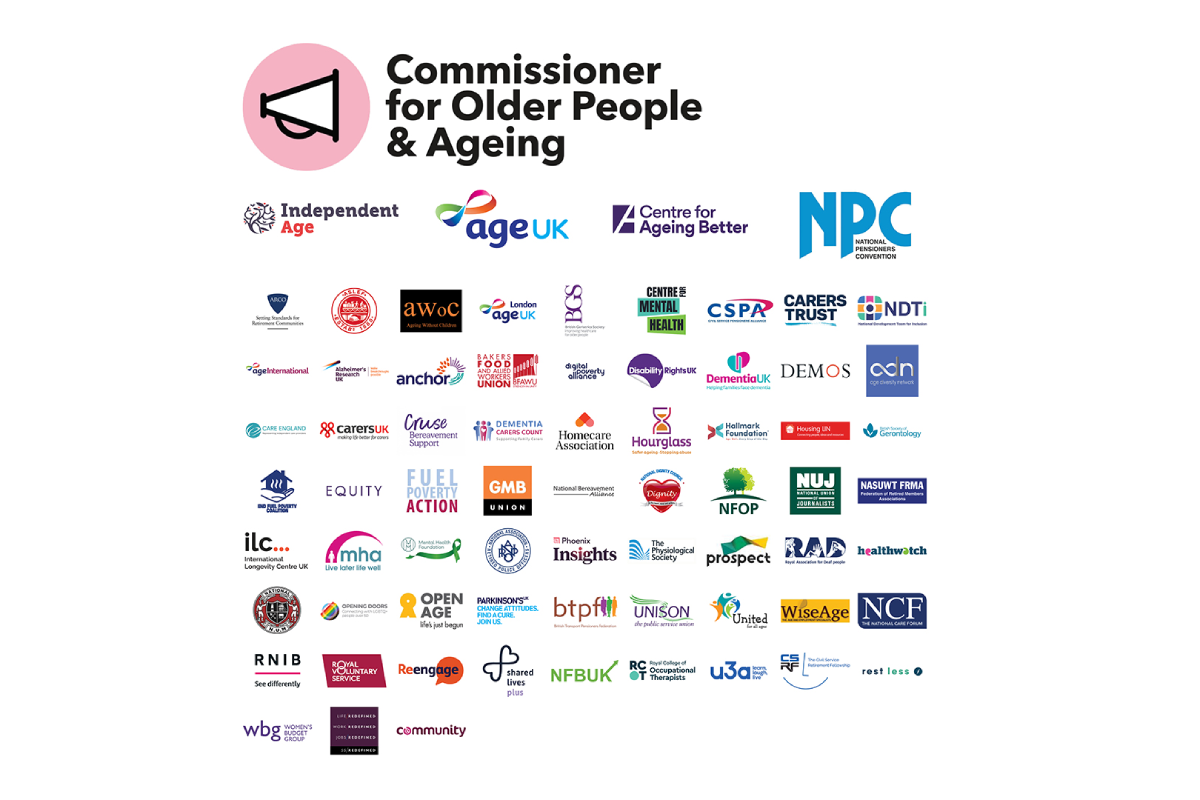More than 70 organisations call for a commissioner to ensure older voices are heard as population ages

Ageing Better is one of four organisations leading the call for a Commissioner for Older People and Ageing in England, in a newly-launched campaign.
A new commissioner is needed to ensure government is better prepared with a cross-department response to meet the challenges of our ageing society. You can join the call for a Commissioner now.
72 organisations have joined together to call for better representation for older people across government-policy making.
Led by charities Independent Age, Age UK, the Centre for Ageing Better and campaigning organisation the National Pensioners Convention, the group has today launched its consensus statement on the need for a Commissioner for Older People and Ageing in England.
The role would move toward the approach of Wales and Northern Ireland, where older people have benefitted from a commissioner for more than 10 years.
Currently 11 million people in England are aged 65 or over. In less than 20 years, over 17 million (1 in 4) people will be over 65. Despite this being a wide and varied group, for too long the organisations say older people have been tarred with ageist stereotypes that can stop people from getting the support they need.
To support the diverse needs of older people and the ageing population, the statement calls on the government to appoint a commissioner to act as an independent champion for older people. The role would ensure that the long-term needs of people in later life and the challenges faced by the population as they age are considered in policy and practice across all government departments.
The call is also backed by the public. In a recent YouGov poll commissioned by Independent Age, nine in ten (89%) of people aged 65 and over said they would support the creation of a commissioner.
Dr Carole Easton, Chief Executive at the Centre for Ageing Better, said:
“In 2021, 200,000 more people celebrated their 50th birthday than their 18th in the UK. In 20 years’ time, one in four people will be over 65.
“At present, we are not prepared for the complex social and policy challenges this demographic change will bring. As a result, the growing inequality in older age groups we are currently seeing will only get worse.
“To meet the needs of older people both now and in the future to ensure we can all be supported to age well, we need a much more ambitious and strategic response. We believe a Commissioner for Older People and Ageing will help deliver the long-term planning needed to reshape our economy and public services for the future and for the benefit of the whole country.”

Morgan Vine, Head of Policy and Influencing at Independent Age, said:
“Despite our ageing population, Independent Age often hears from people in later life who tell us they feel invisible and that their views are not represented.
“There is a dangerous stereotype that all older people are living a comfortable and financially secure retirement when the reality is that many are struggling to make ends meet. Too often, older people are not given the opportunity to voice their experience to determine what they need, including better financial support. This cannot continue.
“We all hope to grow older and we all need a champion at the heart of government who will stand up for everyone in later life. We urge the government to appoint a Commissioner for Older People and Ageing, so no one feels left out of the conversation as they age.”
Issues impacting on older people
A commissioner would work alongside the Older People’s Commissioners for Wales and Northern Ireland, to help make the UK the best place in the world to grow old. If created, a commissioner in England would encourage collaboration and joined-up thinking to deliver policy solutions that benefit everyone as they age. They would make independent recommendations and have the power to launch inquiries to resolve issues for older people now and in the future. They would represent and amplify different views on the problems that older people say they are struggling with. Currently these include:
- Financial hardship – pensioner poverty has increased over the last decade. Currently around 2.1 million people over 65 live in poverty yet Pension Credit, an essential income top-up for older people who are struggling financially, has the lowest uptake of all income-related benefits. One in five people aged 50-70 say they will be unable to meet future financial needs in old age.
- The cost-of-living crisis – increasing prices are having a devastating impact on older people. When surveyed, 27% of people over 65 in England said the rise in the cost of living has made their physical health worse and 35% said it has made their mental health worse.
- Older workers dropping out of the workforce earlier – two thirds of people in their 50s and 60s report a long-term health condition, and a third say their health impacts their ability to work.
- Health and social care – many older people frequently suffer from diminishing health and mobility. Yet the delivery of health and social care services to older people so often fails.
- Inclusion – digital, social and economic. Many older people still cannot access the internet – either due to cost or simply through lack of knowledge or confidence. At the same time, older people are seeing local transport services being reduced. This is leading to increased feelings of isolation.
Jan Shortt, General Secretary, National Pensioners Convention, said:
“We believe that older people have the right to choice, dignity, respect, independence and security as integral and valued members of society.
“All too often the value of our experience and knowledge gained throughout our lives is ignored. We are not seen to contribute to society because we are no longer working or viewed as productive. Yet tomorrow’s older people will be today’s young people – our children and grandchildren. That’s why we believe it is time for a serious change of perception and culture around the older generation.”
Caroline Abrahams, Charity Director at Age UK, said:
“One of the big lessons from the pandemic was how easily older people's views and interests were overlooked in the corridors of power, at a time of crisis. If there had been a Commissioner for Older People in place this might not have happened, and perhaps fewer older people would have lost their lives in care homes.
“It would be wonderful to think that something good could come out of such a traumatic time for our country, for older people especially, as they accounted for the vast majority of all those who died. All the evidence is that the Commissioners for Older People in Wales and Northern Ireland play valuable and constructive roles, so it's about time all the older people in England benefited too."
